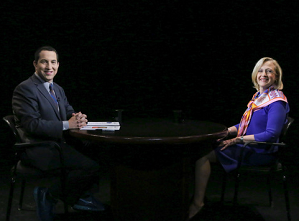PBS' Kerger Concerned About Broadcast Landscape Post-Auction

The smarter way to stay on top of broadcasting and cable industry. Sign up below
You are now subscribed
Your newsletter sign-up was successful
PBS President Paula Kerger says she does not know which noncommercial TV stations were or were not participating in the FCC's specctrum auction, but that she is concerned about how the broadcasting business will look post-auction and wants to make sure the medium remains "robust and accessible."
In an interview with Alexander Heffner, host of PBS series The Open Mind, Kerger pointed to the people who rely on over-the-air TV, for whom cable is a luxury--and a bill--they can't afford.
While she also talked about the number of different platforms on which noncom programming is available, she signaled she did not want to see a divide between online programming haves and broadcast have-nots.
"I sometimes feel like we live in this schizophrenic existence because we are very anchored in what has been the root way that people have received our content over the air at the same that we’ve made sure we’re on all these other platforms so that we’ve created choice and convenience for people, that they can access content wherever they want to to access it, and I want to make sure that when we get on the other side of this, we haven’t created a deeper divide, if in fact people are no longer able to access content that they once did over the air," she told Heffner, according to a copy of a transcript from the interview, which airs next week.
Asked about whether stations should be participating in the auction, she said that was an individual decision. "[E]very station has to weigh the pros and cons of whether having more resources to do more locally against having a little less capacity for the over the air," she said, referring to the option of giving up spectrum and sharing with another station.
They can’t get completely out of the over the air business, or they’re no longer a public station, and so I think that – you know - some balance of that. Where there is a real issue, though, is that some of our stations are owned by universities, and so if that station goes away and there is no public broadcaster, that is a problem.
Kerger also said she was concerned about parents of noncoms that are not media operations. "They may be universities, they may be states, they may be other entities that may not have the same focus on providing media, and those are the places where I think we just have to watch and, and figure out how we can mitigate, if in fact the reality comes that they’re out of the television business."
The smarter way to stay on top of broadcasting and cable industry. Sign up below
Contributing editor John Eggerton has been an editor and/or writer on media regulation, legislation and policy for over four decades, including covering the FCC, FTC, Congress, the major media trade associations, and the federal courts. In addition to Multichannel News and Broadcasting + Cable, his work has appeared in Radio World, TV Technology, TV Fax, This Week in Consumer Electronics, Variety and the Encyclopedia Britannica.

